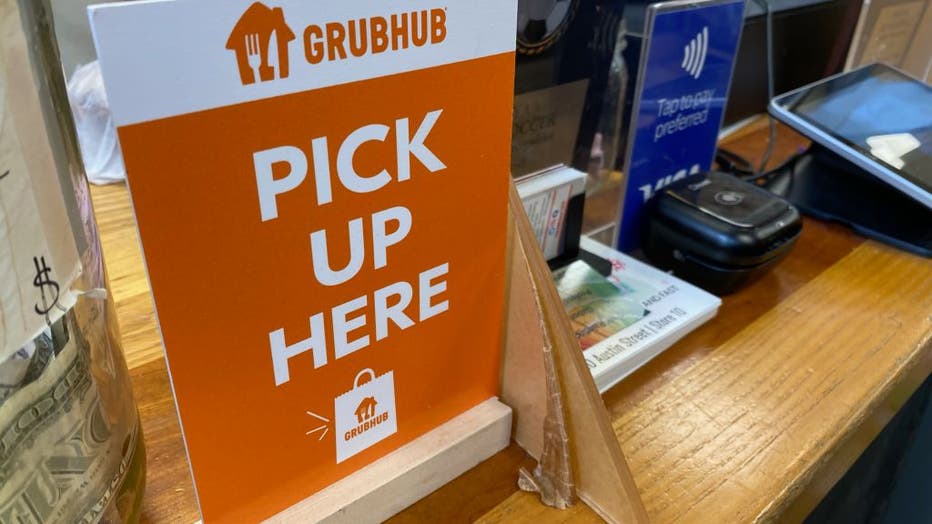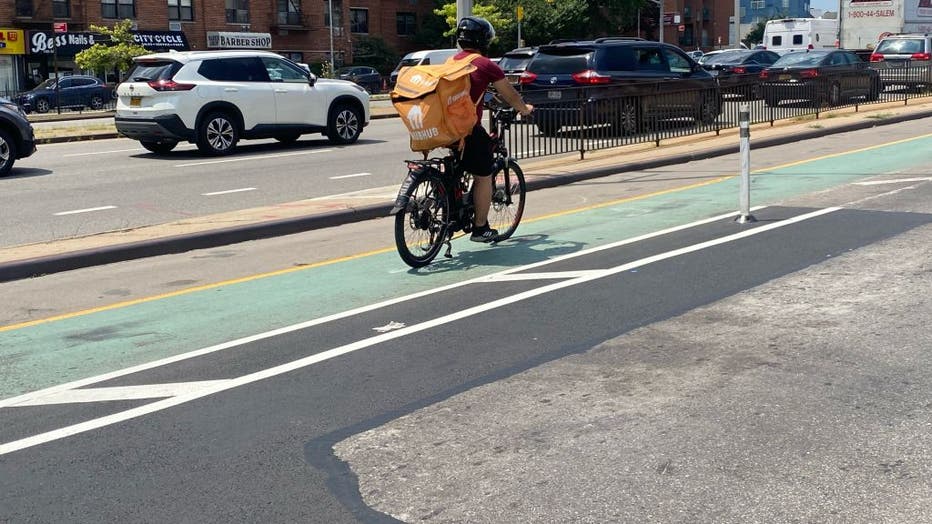NYC implements minimum wage increase for app-based workers, marking national first

A food delivery guy with bicycle is seen at the Times Square in New York City, United States on December 29, 2021. (Photo by Tayfun Coskun/Anadolu Agency via Getty Images)
NEW YORK - New York City will implement a minimum pay rate for food delivery workers on apps like Uber Eats and DoorDash — marking a first for the U.S., officials said this week.
The new rule could nearly triple average earnings for app-based delivery workers in the coming years. New York’s more than 60,000 delivery workers currently make an average of $7.09 an hour, according to the city. But on July 12, an increased pay rate of $17.96 an hour will take effect — and that minimum wage is set to rise to $19.96 by April 2025, the city said. For years following, the minimum pay rate will be adjusted annually for inflation.
"Our delivery workers have consistently delivered for us — now, we are delivering for them," New York City Mayor Eric Adams said in a Sunday statement announcing the Department of Consumer and Worker Protection’s new rule. "This new minimum pay rate, up by almost $13.00/hour, will guarantee these workers and their families can earn a living, access greater economic stability, and help keep our city’s legendary restaurant industry thriving."
Ligia Guallpa, executive director of the Brooklyn-based Worker’s Justice Project, called the move a "historic moment for New York City" — as labor organizers across the country call for better pay and improved working conditions for gig workers, who often face unreliable earnings and little safety protections.
- RELATED: Teamsters give UPS ultimatum, demanding best contract offer by Friday or risk 'imminent' strike
- RELATED: 1,000 young people sworn in NYPD's Summer Youth Employment Program
"This rule will set the pay floor for all the essential deliveristas who work tirelessly — whether through a pandemic, a snowstorm or wildfire smoke — and who have been denied a living wage for far too long," Gullapa said in a statement. "While there’s still work to do, a minimum pay rate for food delivery workers will transform the lives of thousands of families across the city and deliver long overdue justice for deliveristas."
While Guallpa and others applauded New York’s new minimum pay rate, food delivery services including Uber Eats and DoorDash have pushed back — arguing that the decision could have unintended consequences on app workers.
"The city is lying to delivery workers — they want apps to fund this increase by eliminating jobs and reducing tipping while forcing the remaining workers to deliver orders faster," Uber Eats spokesperson Josh Gold said in a statement sent to The Associated Press.

Grubhub pick up area sign, tap payment scanner and tips jar at The Nut Factory, Queens, New York. (Photo by: Lindsey Nicholson/UCG/Universal Images Group via Getty Images)
Grubhub, which noted it believes the city "had good intentions," also expressed disappointment and similar concerns over the rule. Meanwhile, DoorDash said it may pursue legal action.
"Given the broken process that resulted in such an extreme final minimum pay rule, we will continue to explore all paths forward — including litigation — to ensure we continue to best support Dashers and protect the flexibility that so many delivery workers like them depend on," DoorDash said in a statement.
Under the new rule, food delivery services will have some flexibility in how they pay new workers. Apps can choose if they want to pay delivery workers per trip, per hour worked or another policy created by the company — as long as earnings meet the minimum pay rate, the city said.
RELATED: Powell expects more Fed rate hikes because of persistently high inflation
RELATED: Americans are getting tired of tipping, survey shows. Here’s why
With the $17.96 minimum rate taking effect next month, apps that pay workers for all the time they are on call (connected to the app) will be required to pay about 30 cents per minute, not including tips. For apps that only compensate for trip time, that rate will be about 50 cents per minute, not including tips, in 2023 — and is expected to rise to 53 cents per minute in April 2024 and 55 cents per minute in April 2025, plus inflation adjustments.
The future rate of 55 cents per minute could add up to $33 per hour of trip time — but drivers are rarely able to spend the entirety of their shifts on trips. The Department of Consumer and Worker Protection found that workers spend about 60% of their working time engaged in trips and 40% on call.
The implementation of the minimum pay rate follows a law passed by the New York City Council in 2021, which required the Department of Consumer and Worker Protection to study the working conditions and pay of app-based food delivery workers and and establish a minimum rate based on the findings.

GrubHub delivery person on electric bike in the bicycle lane on Queens Boulevard, Queens, New York. (Photo by: Lindsey Nicholson/UCG/Universal Images Group via Getty Images)
The study was published last year, and this week’s final rule was established after a public comment period. The minimum wage takes into account that app-based workers are as independent contractors — who often must pay out-of-pocket for expenses and do not have workers’ compensation insurance or paid time off.
Supporters of the new minimum pay rate include U.S. Senate Majority Leader Chuck Schumer and a handful of local politicians — as well as labor organizers like Los Deliveristas Unidos, Desis Rising Up & Moving and Movimiento de Repartidores de NYC.
Justice For App Workers coalition also celebrated the move as a "step forward" — but said that further protections are needed, pointing to the potential of workers being locked out of their delivery apps while on the job.
"As it stands, the way the city designed this raise could lead to lockouts, which could leave us worse off than we are now. If a worker is locked out of an app without warning, they just won’t be able to make enough money that day. It doesn’t have to be this way," Justice For App Workers said in a statement to The Associated Press. "This is a good measure, but we also need assurances that ensure delivery workers will not be locked out at a moment’s notice. These jobs are all we have to cover paying our rent and feeding our families."
When contacted by The Associated Press about these concerns, Department of Consumer and Worker Protection press secretary Michael Lanza said that it is "illegal for an app to deactivate a worker who is exercising their rights under any of the laws DCWP enforces" — urging workers to report any complaints to the city.
Associated Press contributed to this report.

